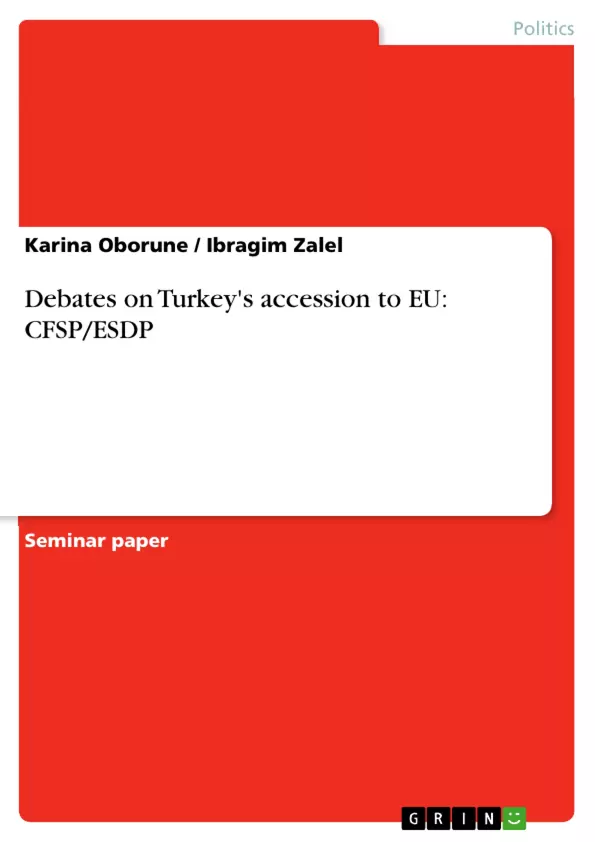Authors have proved hypothesis: Turkey’s military capabilities, experience in NATO and
international peace keeping operations and missions could rather strengthen than weaken
ESDP position. However, there are some weaknesses that Turkey faces (focus on ‘hard’
rather than ‘soft’ power, military is in the process of modernizing, underestimated role in
peace keeping operations), Turkey’s contribution to ESDP is too significant (strong
involvement in the missions) and will give more benefits than costs. Furthermore, Turkish
accession to the EU would transform strategic challenges of ESDP.51
Only five of twenty ESDP peace keeping operations have been of a military nature, which
mostly has been held by NATO or UN. “When it comes to much bigger military issues, the
EU avoids taking strategic responsibility and still depends on the NATO to do its ‘dirty
work’”52. Therefore military stronger EU would give NATO and UN credit that EU is also
responsible in the field of crisis management. Such win-win situation would exempt US
Secretary’s of State Madeleine Albright’s the “3 D’s”: 1) decoupling of ESDP from NATO,
2) duplication of capabilities, 3) discrimination of non-EU NATO members.53 Turkey would
also play role of agent between EU and NATO and “parties involved will benefit from threelevel
game”54 (EU-Turkey-NATO). Therefore it is advantageous and beneficial not only for
Turkey, but also for the EU and the NATO as well.55
Finally, last week Enlargement Commissioner Olli Rehn once more showed that EU would
not allow Turkey 'cruise control' on accession.56 Therefore Turkey-EU relations should
balance the contributions and benefits of such partnership and show that both partners can be
producers and consumers of security and experience of defence. Such dialogue will prove that
EU can play an important role in CFSP/ESDP dimension also in the future.
Inhaltsverzeichnis (Table of Contents)
- INTRODUCTION
- 1. TURKEY'S BENEFIT FROM AND CONTRIBUTION TO CFSP
- INTRODUCTION: TURKEY AND CFSP
- 1.1. TURKEY AS “SECURITY CONSUMER”
- 1.2. TURKEY AS \"SECUTITY PRODUCER”.
- 2. TURKEY'S BENEFIT FROM AND CONTRIBUTION TO ESDP
- INTRODUCTION: TURKEY AND ESDP
- 2.1. TURKEY AS “EXPERIENCE PRODUCER”.
- 2.2. TURKEY AS “EXPERIENCE CONSUMER”
- CONCLUDING REMARKS
Zielsetzung und Themenschwerpunkte (Objectives and Key Themes)
This paper aims to explore the benefits and drawbacks of Turkey's accession to the European Union in regards to the Common Foreign and Security Policy (CFSP) and European Security and Defence Policy (ESDP). It examines the question of whether Turkey's membership would bring more security to the EU and vice versa. The paper utilizes descriptive, comparative, and analytical methods to draw conclusions based on two hypotheses: firstly, that Turkey's accession brings more advantages than challenges to the EU's CFSP, and secondly, that Turkey's military capabilities and experience in NATO and international peacekeeping operations could strengthen the ESDP. To test these hypotheses, the study examines Turkey-EU relations in the regional security dimension of CFSP and the defence dimension of ESDP. The main conclusion focuses on assessing the extent to which Turkey can contribute to EU foreign, security, and defence policy, determining whether the "security and experience producer" role outweighs the "security and experience consumer" role.
- Assessing the impact of Turkey's accession to the EU on the Common Foreign and Security Policy (CFSP)
- Evaluating the benefits and challenges of Turkey's membership for the European Security and Defence Policy (ESDP)
- Examining Turkey's potential contribution to EU security and defense policy, both as a "security producer" and a "security consumer"
- Analyzing Turkey-EU relations in the context of regional security, focusing on the Middle East, Caucasus, and Caspian Sea regions
- Exploring Turkey's role in international peacekeeping operations and missions, and its impact on the ESDP
Zusammenfassung der Kapitel (Chapter Summaries)
The first part of the paper focuses on Turkey's potential benefits and drawbacks from participating in the Common Foreign and Security Policy (CFSP) through the lens of regional security. The hypothesis explored in this section is that Turkey's accession brings more advantages than challenges to the EU's CFSP, ultimately leading to a stronger and more effective policy. It examines the question of whether Turkey's involvement would strengthen or weaken the CFSP by analyzing Turkey's potential as both a "security producer" and a "security consumer".
The second part delves into the benefits and contributions of Turkey's participation in the European Security and Defence Policy (ESDP). Here, the hypothesis posits that Turkey's military capabilities and experience in NATO and international peacekeeping operations would strengthen the ESDP rather than weaken it. The section explores Turkey's role as both an "experience producer" and an "experience consumer" in relation to the ESDP. The analysis focuses on Turkey's contribution to regional security and its impact on the EU's defense capabilities.
Schlüsselwörter (Keywords)
The main keywords and focus topics of this paper include Turkey, European Union, accession, Common Foreign and Security Policy (CFSP), European Security and Defence Policy (ESDP), regional security, Middle East, Caucasus, Caspian Sea, security producer, security consumer, experience producer, experience consumer, military capabilities, NATO, peacekeeping operations, and international relations.
Frequently Asked Questions
How would Turkey’s EU accession impact the ESDP?
Turkey’s strong military capabilities and experience in NATO could significantly strengthen the European Security and Defence Policy (ESDP).
Is Turkey a "security producer" or a "security consumer"?
Turkey acts as both; it consumes security through EU/NATO frameworks but produces security via its active role in international peacekeeping missions.
What are the strategic benefits of Turkey joining the EU?
Turkey would act as a strategic bridge between the EU and NATO and enhance the EU's influence in the Middle East, Caucasus, and Caspian regions.
What are the main weaknesses Turkey faces in its accession bid?
Key weaknesses include a traditional focus on "hard" military power over "soft" power and an ongoing process of military modernization.
What are Madeleine Albright’s "3 D’s" regarding ESDP?
They refer to the risks of decoupling ESDP from NATO, duplication of existing military capabilities, and discrimination against non-EU NATO members like Turkey.
- Citar trabajo
- Karina Oborune (Autor), Ibragim Zalel (Autor), 2009, Debates on Turkey's accession to EU: CFSP/ESDP, Múnich, GRIN Verlag, https://www.grin.com/document/169167



